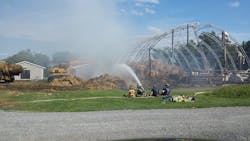Pennington: Do Rural Firefighters Need Better Training?
Since the early years of my fire service career I have been spent the majority of my time serving in city departments. Occasionally we needed to drop a dump tank or nurse off a tanker, but it was very rare. We also don’t need to wait long for the next mutual aid companies to arrive -- it only takes minutes. Serving in these environments for the past 11 years has definitely spoiled this jumpseat rider. As many times as we complain about short staffing or low turnout we have it made compared to many firefighters around the world.
A recent weekend trip become an amazing journey of learning as I set out for the rural parts of my home state teaching a hoarder fires class. Surprisingly the one doing the learning was me. As I traveled deep into the beautiful hills of West Virginia I couldn’t help to think, where is their nearest mutual aid company? How many firefighters do they get on a first alarm assignment? And, where in the heck do they get their water supply from?
Talking to the firefighters from the area I must say they have one thing figured out: how to do more with less. In their area this comes from need, not want. They have developed skills that some city firefighters would not understand. Two of them stood out as the weekend progressed.
First is the ability to think outside the box. We all attend the normal Firefighter 1 and 2 classes to receive our basic training. During this training, critical thinking skills and adaptive behaviors are not really included. It is vitally important that we can perform the basic skill set of a jumpseat firefighter. Pulling hose, forcing doors, and raising ladders are all essential skills, but where does chicken barn fires come into play? Yes, you heard it, a chicken barn! My first thought was where in the heck can you fight fires with thousands of chicken running out!
It’s these types of situations where the rural firefighters have it figured out. They understand what it takes to gather the chickens, draft from a pond and save the other three barns as the initial one is going to be a total loss. In this process they can arrive on scene, pull a draft and get three large diameter hoselines into operation with three firefighters. Now that is what I would call #jumpseatready.
Secondly, new fire dynamics are not new to them. You see, these firefighters have been using the dreaded “transitional attack” for years. Due to the low staffing numbers and limited water supply they limit the number of interior attacks. But instead opt for locating the seat of the fire, applying water nearest the seat of the fire and calling for the additional resources to finish the job. Sound familiar? Today’s science justified the technique used by many rural areas for years. Can the fire be completely extinguished? No, but it can be held in check until the resources need to finish the job arrive.
Its is rural versus urban? Who needs to be better trained?
I would say they both do with each having its own applications for various challenges. You may never see a middle of the row townhouse fire in the rural setting and you may never see an urban fire department having to pull a draft, but we must understand the skills necessary to get the job done. This jumpseat rider can see the benefit in teaching urban firefighters some rural water skills in case of water system failure and I can see the need for rural firefighters to learn the skills needed to fight multifamily dwelling fires. Each of these cases are small examples of what we can learn from each other and should be added into our training programs.
Don’t be afraid to think outside the box on your next fire. Remember the can do attitude of our rural folks who are faced with this thought process every day! Stay safe everyone!
Firehouse partnered with the Rural Firefighting Academy to provide online training for various rural firefighting topics. Learn more here.
